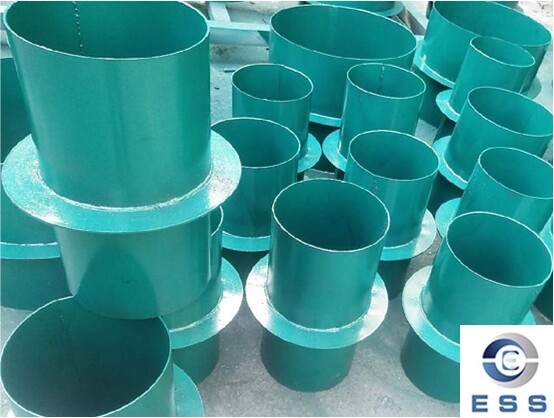
Steel casing pipe is an important tool used in drilling and oil and gas development. It is
usually made of seamless
steel pipe and has good high temperature and pressure resistance. It is
widely used in petroleum, chemical, geology, metallurgy, construction and other
fields. Steel casing pipe is usually composed of two pipes of different
materials. The inner pipe is used to transmit fluids or solid particles, and
the outer pipe is used to support the inner pipe.
Classification of steel casing pipe
According to different needs, steel casing
pipe can be divided into many types, as follows:
1. Core casing pipe
Used for well wall damage repair, its inner
diameter is the same as the well wall.
2. Production casing pipe
Used for production operations of oil and
gas wells, water wells, etc., its inner diameter is larger.
3. Test casing pipe
Used to test the production pressure and
flow of oil and gas wells, a variety of specifications are available.
4. Shrink-proof casing pipe
Used for leakage control and hydraulic
fracturing operations during drilling, often used with drill pipe.
5. Gravity casing pipe
Used to prevent wellbore collapse and
braided casing.
Steel casing pipe specifications and
models table
Steel casing pipe has a variety of
specifications and models to meet the needs of different projects and
application scenarios. Common specifications and models include Φ16, Φ20, Φ25, Φ32, Φ40, etc. These numbers represent the
outer diameter of the steel casing pipe in millimeters (mm). In addition to the
outer diameter, the length, wall thickness and other parameters of the steel
casing pipe are also important factors to consider when purchasing.
The following is a table of specifications
and dimensions of some common steel casing pipes for readers' reference:
|
Specification
|
Outer Diameter (mm)
|
Standard Length (mm)
|
Wall Thickness (mm)
|
|
Φ16
|
16
|
200
|
2.0
|
|
Φ20
|
20
|
200
|
2.5
|
|
Φ25
|
25
|
200
|
2.8
|
|
Φ32
|
32
|
200
|
3.2
|
|
Φ40
|
40
|
200
|
3.5
|
(Note: The above table is only an example,
and the actual product may vary depending on the manufacturer and standard.)
Features of steel casing pipe
1. High temperature resistance
Steel casing pipe has a completely
different processing technology, and its manufacturing process can make the
steel casing pipe have good high temperature resistance and can adapt to
various complex environments.
2. Pressure resistance
Steel casing pipe can also maintain good
performance under high temperature and high pressure environments, and can meet
various engineering application requirements.
3. Anti-corrosion performance
Steel casing pipe has good anti-corrosion
performance. After sophisticated manufacturing technology, it can be used in
various complex environments and has a long service life.
Function of steel casing pipe
1. Support the well wall
Steel casing pipe can effectively support
the well wall, making it difficult for the well wall to collapse and deform
during drilling, ensuring the quality of drilling.
2. Maintain the wellbore
Steel casing pipe can prevent the wellbore
from collapsing, landslides, etc., and ensure the stability and safety of the
wellbore.
3. Limit oil and gas leakage
Steel casing pipe can prevent oil and gas
leakage and groundwater pollution in oil and gas wells.
4. Promote production operations
Casing can make production operations
smoother and more efficient, and has a wide range of applications in oil and
gas wells, water wells and other fields.
Application of steel casing pipe
Steel casing pipe is a multifunctional pipe
material that can be used in many fields such as petroleum, chemical industry,
geology, metallurgy, and construction:
1. Oil drilling
As an oil drilling pipeline, steel casing
pipe is mainly used in oil drilling well completion, well wall repair and well
channeling, and has good pressure resistance and wear resistance.
2. Geological engineering
In the field of geological engineering,
steel casing pipe is often used in grouting, cementing and other links. Its
outer layer of pipe can be used as a protective anti-corrosion layer to prevent
groundwater from eroding the grouting material.
3. Construction field
In the construction field, steel casing
pipe can be used in pile foundation facilities, underground pipelines and other
projects, with good pressure resistance and anti-corrosion performance.
Conclusion
Through a comprehensive analysis of the
definition, specifications, models and classification of steel casing pipe, we
can have a clearer understanding of the characteristics and applications of
this steel casing pipe. Steel casing pipe has good high temperature resistance,
pressure resistance and corrosion resistance, and is widely used in petroleum,
chemical industry, geology, metallurgy, construction and other fields. When
purchasing and using steel casing pipe, it is important to make reasonable choices
based on specific needs and engineering environment to ensure the safe, stable
and efficient operation of the pipeline system.
Read more: How To Choose The Size of Steel Casing Pipe? or One-Piece vs. Split Steel Casing Pipe













 Eastern Steel Manufacturing Co.,Ltd not only improve product production and sales services, but also provide additional value-added services. As long as you need, we can complete your specific needs together.
Eastern Steel Manufacturing Co.,Ltd not only improve product production and sales services, but also provide additional value-added services. As long as you need, we can complete your specific needs together.










